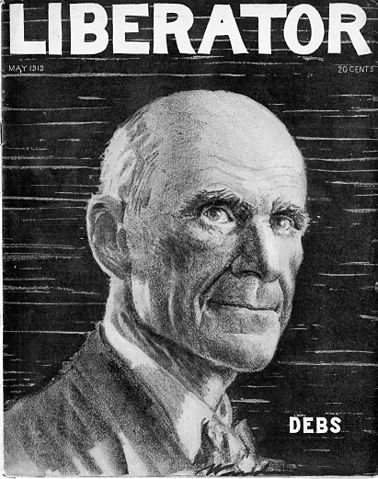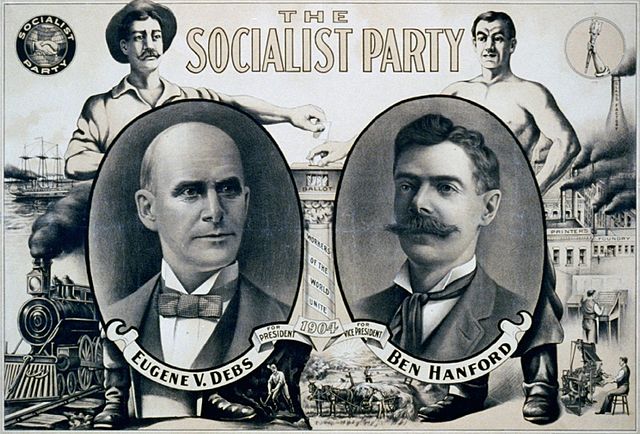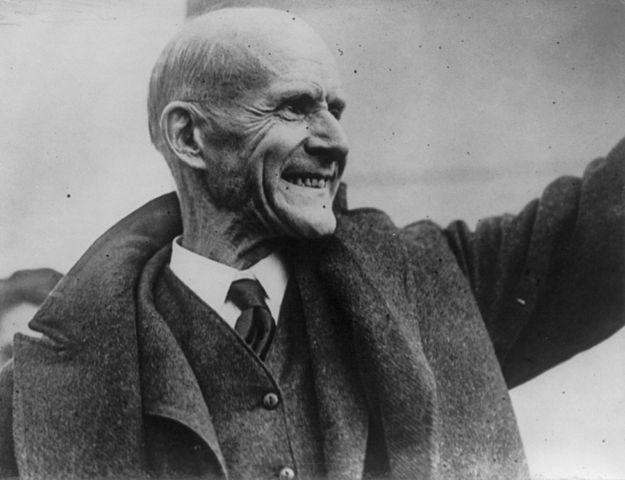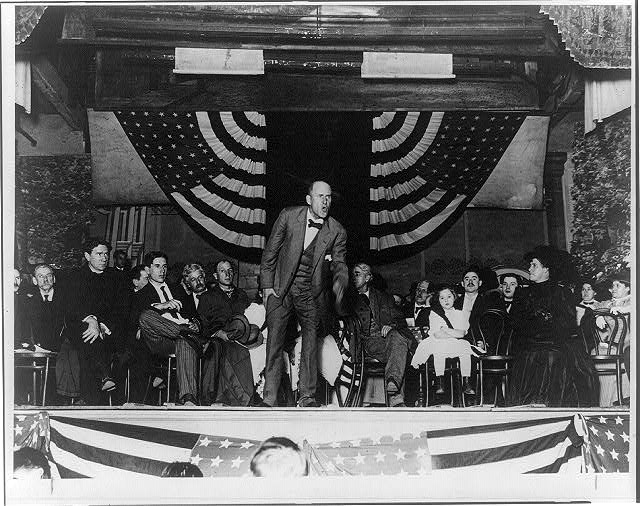Labor leader, socialist, and five-time presidential candidate Eugene V. Debs (1855–1926) had a twofold relationship with the First Amendment.
First, as a member of an unpopular minority, he appealed for protection under the Amendment. Second, as a labor organizer, he was at the forefront of workers’ appeals for statutory protection in an area that appeared to be neglected by the Amendment.
Although Debs lost his battles, his causes won the war.
Debs was a prominent railroad union leader
Debs was born in Terre Haute, Indiana, in 1855. He served his hometown as city clerk from 1879 to 1883; two years later, he served in the Indiana legislature. But it was Debs’ early work at age 14 in the railroad shops and as a locomotive fireman soon thereafter that led to his labor leadership role. He helped organize a local branch of the Brotherhood of Locomotive Firemen and was later elected the union’s national secretary-treasurer in 1880. Debs led a successful strike against the Great Northern Railway that achieved national prominence during the Pullman Strike in the summer of 1894.
Acting as the president of the American Railway Union, which he had formed, Debs led workers in a strike against the Pullman Palace Car (Railroad) Company and a boycott of its enterprises when the profitable railroad reduced wages in its company town of Pullman, Illinois, without enacting a corresponding reduction in living costs.

Debs was a prominent labor leader who was imprisoned for contempt of court after violating a court injunction against a strike and boycott. (Image of Debs on the cover of the May 1919 Liberator via Wikimedia Commons, public domain)
Debs defies court injunction against strike
After violating a district court’s injunction against the strike and boycott, based on the government’s power regarding interstate commerce and mail delivery, Debs and other union leaders were convicted of contempt of court. Debs submitted a habeas corpus petition to the Supreme Court, which ultimately rejected it, based on a claim that he should have been afforded the protection of a criminal trial on the contempt charge rather than a hearing in chancery court.
The Supreme Court’s unanimous holding against Debs In re Debs (1895), as announced by Justice David Brewer, quoting Chief Justice Salmon P. Chase, was based on the “incontrovertible principle, that the government of the United States may, by means of physical force, exercised through its official agents, execute on every foot of American soil the powers and functions that belong to it.” Debs served six months in prison.
Debs ran for president as the Socialist Party candidate
After leaving jail, Debs turned his attention to organizing the Socialist Party. He ran for president as the Socialist Party candidate in the four consecutive elections between 1900 and 1912; he received 94,768 votes in the first and 897,011 in the fourth. However, his work to promote his party’s ideals sent him back to prison.

Debs ran for president as the Socialist Party candidate five times. (1904 Debs campaign poster via Wikimedia Commons, public domain)
Debs convicted of sedition for speech
In 1918, Debs was convicted of giving a speech at Canton, Ohio, against participating in World War I that “caused and incited and attempted to cause and incite insubordination, disloyalty, mutiny and refusal of duty in the military and naval forces of the United States and with intent so to do [he] delivered, to an assembly of people, a public speech.”
He was found guilty of violating the Espionage Act of 1917, which essentially prohibited all acts — including speech — that were seditious, and the Sedition Act of 1918, which strengthened the anti-sedition provision of the 1917 law by making it a crime to “utter, print, write, or publish any disloyal, profane, scurrilous, or abusive language about” the U.S. government, Constitution, or armed forces.

Image of Debs leaving the Federal Penitentiary in Atlanta on Christmas Day 1921. He had been imprisoned in 1918 under the Sedition Act for giving a speech against participation in World War I. President Warren G. Harding commuted his sentence to time served in December 1921. (Image via Library of Congress, public domain)
Court upheld Debs' sedition conviction
Debs lost his appeal to the Supreme Court in Debs v. United States (1919). Writing for the unanimous Supreme Court, Justice Oliver Wendell Holmes Jr. criticized Debs for speaking favorably of imprisoned persons who had been convicted of sedition and other war-related crimes. After a detailed discussion of the content of the speech—including Debs’ comment that he was unable to speak his mind due to restrictions on permissible speech, which Holmes viewed as Debs “intimating to his hearers that they might infer that he meant more” — Holmes affirmed Debs’ conviction.
The Debs decision was handed down one week after the Supreme Court upheld the 1917 and 1918 Espionage and Sedition Acts in Holmes’ famous decision in Schenck v. United States (1919), which introduced the “clear and present danger test.” In Debs, however, the Supreme Court did not consider whether Debs’s speech posed a “clear and present danger.”
Months before Debs' death, Congress passes pro-labor law
Debs received a 10-year prison sentence, of which he served two years. From prison, he ran in his fifth presidential election as the Socialist Party’s 1920 candidate and garnered almost one million votes. President Warren G. Harding pardoned him in 1921.
Debs was vindicated just months before his death with the enactment of the Railway Labor Act of 1926, which gave railway workers more input regarding their conditions of employment. Further, the passage of the National Labor Relations Act of 1935 recognized the general right of workers to organize and act collectively, rights that Debs would have argued were within the spirit, if not the letter, of the First Amendment.
This article was published in 2009. Clyde E. Willis (1942-2017) worked an attorney for 25 years before starting a second career as a professor. He taught political science for 18 years at Middle Tennessee State University. He wrote the Student’s Guide to Landmark Congressional Laws on the First Amendment.

